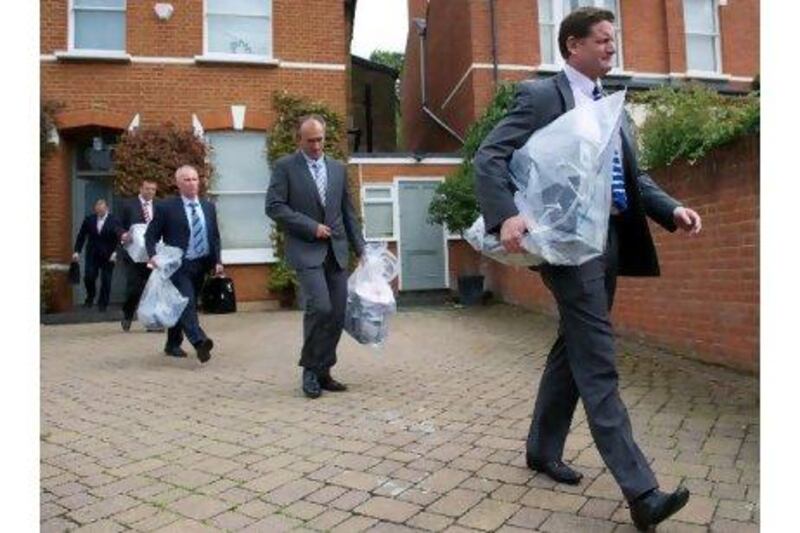LONDON // Andy Coulson, the British prime minister's close friend and former communications director, was arrested yesterday in the latest twist to the newspaper phone hacking saga.
Less than 18 hours after the shock announcement of the closure tomorrow of the News of the World - the country's best-selling newspaper that Mr Coulson edited for four years - he was arrested on suspicion of phone hacking and corruption at a south London police station.
His arrest came shortly after the prime minister, David Cameron, had announced a judicial inquiry into the Sunday tabloid's phone hacking, which police believe could have involved up to 4,000 victims, and into tens of thousands of pounds paid in bribes to detectives by the newspaper's reporters.
Mr Cameron also announced a separate inquiry into the ethics and culture of the UK press, saying that the country's journalism watchdog, the Press Complaints Commission, had failed. "I believe we need a new system entirely," he said.
As the political fallout from the scandal grew, Ed Miliband, leader of the Labour Party, demanded the prime minister apologise for his "appalling error of judgement" in hiring Mr Coulson.
The 43-year-old had resigned as editor of the News of the World in 2007 after the paper's royal editor, Clive Goodman, and a private investigator were jailed for hacking into the voicemails of Buckingham Palace staff.
Mr Goodman was rearrested yesterday on suspicion of making illegal payoffs to police for information, the Press Association news agency reported. Detectives were searching his house south of London, police said.
Although Mr Coulson denied any knowledge of hacking on the Rupert Murdoch-owned newspaper and said the incident was the work of a "rogue reporter", he said he was resigning because the affair happened on his watch.
Months later, he became Mr Cameron's director of communications, resigning in January this year as it emerged that, in fact, hacking had been commonplace under both his editorship and that of his predecessor, Rebekah Brooks, who is now chief executive of News International, the Murdoch parent publishing company in the UK.
Yesterday morning, Mr Coulson arrived for an appointment with detectives to be questioned about the hacking and illegal payments to police officers by News of the World staff. A Scotland Yard spokesman said that he was then arrested on suspicion of "conspiring to intercept communications" and "corruption allegations".
Earlier, at a press conference in Downing Street, Mr Cameron described Mr Coulson as a friend to whom he had given a second chance following his resignation as editor.
Mr Cameron said the decision to hire Mr Coulson was "mine and mine alone", adding: "I take full responsibility for it. I took a conscious choice to give someone who had screwed up a second chance. He worked for me, he worked for me well, but actually he decided in the end the second chance wouldn't work - he had to resign all over again for the first offence."
On the repeated calls for Mrs Brooks to be sacked, Mr Cameron pointed to reports that she had offered to resign but that James Murdoch, who is in charge of his father's media interests in Europe and Asia, refused to accept it. "In this situation, I would have taken it," said Mr Cameron.
The ramifications of the affair now look likely to affect not only the Murdoch empire in the UK - particularly, News Corp's bid to win government approval to buy the 61 per cent of satellite broadcaster BSkyB that it does not already own - but the British press at large.
Long renowned for its robust and sometimes cavalier approach to news gathering, sections of the press were put on notice by the prime minister that things must change. Announcing the inquiry into media ethics and practices, Mr Cameron said: "It is difficult for politicians to call for more regulation of the media, because if we do so, we're accused of wanting to stifle a free press or even free speech.
"But the deeper truth is this: there is a less noble reason. Because party leaders were so keen to win the support of newspapers, we turned a blind eye to the need to sort this issue, get on top of the bad practices, to change the way our newspapers are regulated."
He described the scandal, which attracted public anger only this week when it emerged that not only had celebrities' phones been hacked but those of abducted and murdered schoolchildren, as a "wake-up call".
The 168-year-old News of the World, which still sells 2.6 million copies, will publish its final edition tomorrow after a week when more than a dozen major advertisers had pulled out because of the scandal.
A Sunday edition of The Sun, News International's six-day-a-week tabloid, is expected to appear as a replacement within weeks.






